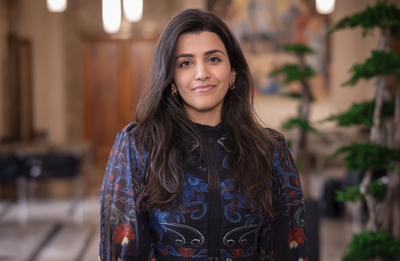29 Oct 2025
Bridging Research and Policy: A Conversation with Maryam AlDoseri, PhD Candidate at the WTI and Newly appointed Chair of the WTO TRIMS Committee
PhD candidate Maryam AlDoseri is one year into her doctoral journey at the World Trade Institute (WTI), where she is exploring the intersections between trade, investment, and regional integration. Alongside her academic pursuits, she was recently appointed Chair of the WTO Committee on Trade-Related Investment Measures (TRIMS) — a recognition of her leadership and expertise in international trade policy. In this interview, Maryam reflects on her experience at the WTI, her research, and her vision for connecting academic inquiry with policymaking.
You’re a year into your PhD journey. How has the experience been so far, and what initially drew you to the WTI?
It’s truly been a very enriching experience. I was drawn to the WTI because it brings together everything I personally value — academic rigor, an international community, and a genuine commitment to connecting research with real-world policy.
Coming from a trade policy background, I wanted an environment that would challenge me intellectually while supporting me in shaping my research. What makes the WTI special, in my view, is the depth of expertise among its faculty, especially in trade law. It’s the perfect environment for the kind of research I wanted to pursue.
The mentorship here also stands out. My supervisors, Isabelle Van Damme and Rodrigo Polanco, challenge me to think critically, yet they give me the freedom to develop my own voice as a researcher. It’s a rare balance — they guide you without directing you, and they push you without overstepping. That balance has made this experience both stimulating and empowering.
Can you tell us a bit about the focus of your PhD research?
I’m still in the research and development stage, but broadly, my PhD explores the feasibility of investment law harmonization within regional blocs.
I’m examining how regional legal and institutional frameworks either enable or limit coordination and coherence in investment, and what this reveals about regional integration efforts more generally. Essentially, it’s about understanding how countries within one region can work together to create more coherent investment frameworks — and what lessons that might hold for other regions around the world.
What kind of impact do you hope your research will have?
My goals are twofold; academically, I want to broaden the discussion on investment beyond the usual North–South perspective and shed light on regional efforts, which are often more complex and less studied. From a policy perspective, I hope my research offers practical insights that help policymakers design more coherent investment frameworks — ones that bring regional benefits while respecting national development priorities.
Ultimately, I want to help bridge the gap between academia and policymaking. I believe these two worlds are deeply connected: research can and should inform real-world decisions, and policy challenges can inspire more relevant academic inquiry.
What advice would you give to new PhD candidates who want to bridge academia and international policymaking?
I’d say: don’t feel that you need to choose between the two. They’re not separate paths — they complement and strengthen each other.
The analytical depth you gain from research makes you a better policymaker, and hands-on policy experience makes your academic questions more relevant. It can be demanding to balance both, but if you approach them as interconnected rather than competing, it becomes a much more fulfilling journey.
Congratulations on your appointment as Chair of the WTO Committee on Trade-Related Investment Measures (TRIMS)! What does this role entail?
Thank you so much — I truly appreciate that. It’s a real honor to serve in this capacity.
The TRIMS Committee oversees the implementation of the TRIMS Agreement, which governs investment measures that may restrict or distort trade. As Chair, my main role is to facilitate open and balanced dialogue among WTO Members, ensuring that all perspectives are heard and that discussions remain constructive, inclusive, and transparent.
Ultimately, it’s about fostering cooperation and maintaining an environment of trust and dialogue — something that’s essential for effective multilateral engagement.
From your perspective, what role do institutions like the WTI play in shaping future trade and investment governance?
Institutions like the WTI are absolutely essential. They bring evidence-based thinking to complex policy debates and provide a neutral space for dialogue — something the international system really needs.
The WTI, in particular, has a strong ability to translate rigorous academic research into policy-relevant insights. That’s invaluable in helping governments and international organizations make decisions that are grounded both in law and in practical reality. I think that’s where the WTI’s real strength lies — in bridging the gap between theory and practice.
Finally, what inspires you most about your work in international trade, and what message would you share with the next generation of WTI scholars and practitioners?
What inspires me most is the human element of trade. Behind every policy discussion are real people — livelihoods, communities, and opportunities. Trade connects people, and when it works well, it can transform lives.
My message to the next generation would be: never lose sight of the “why.” It’s easy to get caught up in technical details, but remembering the purpose behind your work brings clarity and meaning.
Whether you’re doing research or shaping policy, always ask: Why does this matter, and how does it translate into real-world outcomes? Keeping that focus helps ensure that what we do ultimately serves people — which, to me, is what international trade is all about.
About Maryam AlDoseri
Maryam AlDoseri is a PhD candidate at the World Trade Institute (WTI) focusing on investment law harmonization and regional integration. She currently serves as Chair of the WTO Committee on Trade-Related Investment Measures (TRIMS). With a background in trade policy and a passion for connecting research and practice, Maryam represents the next generation of global trade leaders dedicated to making trade work better for people.
Please note: The views expressed are those of the interviewee in her personal academic capacity.


